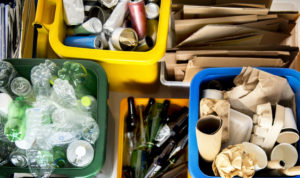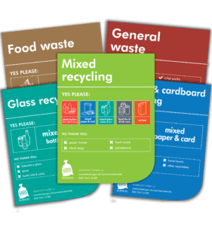Ever wondered how your business can make a difference? 18 March is the perfect time to get started. This date is set for Global Recycling Day 2023 and the theme is #RecyclingHeroes. Read on to learn about changes that you and your team could make to protect the environment and have a positive impact on your community.
What is Global Recycling Day 2023?
Global Recycling Day was started by the Global Recycling Foundation in 2018 to highlight the importance of recycling and the need for a shared, joined-up approach. It also asks individuals to recognise the value of resources and recycled goods, and how each one of us can avoid waste in the first place.
Why is that so important? Well, we all know the importance of protecting the environment. In 2019, the president of the UN’s General Assembly, Maria Fernanda Espinosa Garces, said, “We are the last generation that can prevent irreparable damage to our planet”. Using up and wasting resources rather than re-using them adds to the man-made pressure on the environment and contributes to climate change. A significant number of the resources we use every day, such as food, textiles, plastics and metals, come with a significant carbon footprint, especially when they are simply discarded rather than recycled. Recycling materials saves over 700 million tonnes of CO2 emissions a year – projected to increase to 1 billion tonnes by 2030.
Climate change is a serious issue for the City Council. As the busy centre of the capital, Westminster has some unique challenges, including some of the worst air pollution in the UK. It also has some of the highest carbon emissions, with the 22 square kilometres (8.9 square miles) of Westminster producing more of them than the whole of Cardiff or Newcastle. As a result, Westminster City Council has committed to becoming carbon neutral by 2030 and for the whole city to follow by 2040 (10 years ahead of government targets). This is part of a wider commitment to set ambitious targets and work towards greater sustainability, including maximising management of waste through reduction, re-use and recycling.
As Global Recycling Day comes round, showcasing the importance of being a recycling hero, we challenge you to set new recycling goals for your business! Read on for some ideas about what you could do.
Related read: Boosting sustainability in Big Energy Saving Week 2021
Ways to improve recycling in your business
According to the Waste and Resources Action Plan, reaching recycling targets “won’t happen without radical change”. Here are four ways Westminster businesses can help to redress the balance.
1. Educate your team about how to get recycling right
There is alot of information available on our blog about how to recycle better. You can also find useful downloadable guides on our resources page, covering topics from food waste to plastic waste. Many of the guides are designed for specific business sectors, including retail, offices, hospitality, museums and institutions, plus information for facilities managers.
Download a free resource now: the ultimate guide to recycling for Westminster businesses
If you want to know how effectively your business is handling its recycling at the moment, we have a recycling performance calculator to help you find out.
To get you started with the key things you need to know, consider these questions:
Could you produce less waste?
Recycling means that resources can be given a second life instead of being wasted. However, if you can avoid waste in the first place – e.g. using reusable cups instead of single-use paper ones – this is even better. This avoids a single-use item having to be collected and recycled since recycling still comes with an energy and carbon impact. By reducing waste you also avoid having to spend money on having it taken away again. It also helps you save on the amount of internal space you need to store your waste until it is collected.
Are you segregating your waste?
This is really important! If non-recyclables are included with recyclables, they can contaminate whole loads. Be sure to separate the different waste types into their designated bins so that recycling can happen. Find out how to segregate and manage your rubbish correctly in this downloadable guide.
Have you found out your correct waste collection and recycling times?
You can do so by entering your street name here. If you use waste bags and present them for collection on the pavement, remember to only place waste out at the designated collection time to avoid fines for fly-tipping. Using the correct collection time helps to keep streets tidy and means recycling and waste collection services can work efficiently. Those businesses that use our bins and containers have a bespoke collection schedule agreed in advance, which helps keep waste off the street.
2. Set company-wide goals
To make sure recycling happens effectively on a continuous basis, ensure that someone is responsible for making recycling better in your organisation. If you are a small company, this could come down to deciding on a recycling and waste management plan that you stick to. It should list what you want to achieve and how. For larger organisations, you may already have a formal Corporate Social Responsibility (CSR) or Environmental, Social, and Governance (ESG) policy that sets goals around reducing and recycling waste, but if not, we would be happy to help you further. If having a CSR and ESG policy is too comprehensive for now, then start smaller by just having a simple waste management plan for your business. Download our sustainability guide for businesses for some straightforward tips.
3. Follow up on your goals
When Westminster City Council first committed to going carbon neutral by 2030, the Deputy Leader of Westminster City Council, Tim Mitchell, warned: “Our targets are ambitious but setting the target is the easy bit.” It’s important to track progress and make adjustments once your goals around environmental performance have been set.
Make sure your business’ own recycling and waste targets are tracked, monitored and adjusted instead of just being nice-to-haves. To help make this happen, work out what you will need to do, how you will achieve it, how and when you will monitor progress and when it will take place, adding all of this information to your waste management plan.
We can support you with affordable, reliable waste and recycling services with performance reports on how much you throw away and recycle. We also offer training for your staff and service providers or contractors. In addition, you could book a waste audit to assess what exactly is in your waste and how you can recycle more of it. We will be happy to give you recommendations on ways to improve things.
4. Keep it up
Effective recycling takes consistency. Once you have the right processes and timings in place, make an effort to stick to them as much as possible. Reminders such as posters and stickers will help you and your staff keep to practices such as segregating waste streams, as does repeat training for site staff and contractors. You could also ask us about regular monitoring and reporting, so you can see how well your plans are performing and see the difference you are making.
Find out more about recycling services available in Westminster
We have a high-quality and well-established infrastructure in place to handle Westminster’s waste management and recycling needs in an environmentally responsible way. Our services are honest, reliable, affordable and convenient, so it is well worth finding out how Commercial Waste Services can help your business with better waste management solutions.
We are committed to improving the environmental impact of our services. We have not sent waste to landfill for many years: we locally treat that waste which has been kept segregated for recycling and generate low-carbon renewable energy from non-recyclable waste. Using locally based waste-treatment facilities helps cut the mileage that waste has to travel from the point of collection to the place where it is treated (as opposed to sending waste across the whole of London, the country or exporting it abroad). Fewer waste miles means less air pollution from vehicles, lower carbon emissions and less congestion on London’s busy roads.
We have also invested in an industry-leading and award-winning electric refuse collection fleet, helping to tackle London’s air pollution problem. By contrast, private commercial waste collectors contribute to emissions by duplicating the waste collection journeys the City Council already makes and by using less efficient vehicles.
If you would like more advice on recycling better or to speak to somebody about the services we offer, feel free to get in touch.






